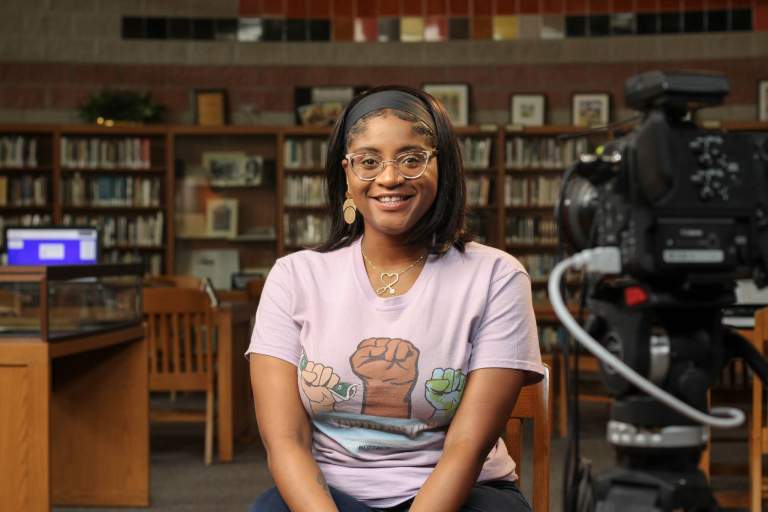
Tamara Cross was a 2022 Open Buffalo Civic Engagement Fellow.
Open Buffalo Civic Engagement Fellowship Reflection
Published November 13, 2022
By Temara Cross
Being afforded the gracious opportunity to be a civic engagement fellow with Open Buffalo allowed me to actively utilize and reflect on the tools I gained from previous leadership development and community engagement experiences. I also learned new skills that will ultimately help in efforts of advocacy, organizing, and campaigning.
My initial projects included phone and text banking to encourage registered voters to vote in the general election of 2022. This experience reminded me of the essential importance of educating voters on where to find the correct information so that they have the autonomy to make informed voting decisions. For instance, some new voters were not aware of where they could find information on their respective polling places, and I was able to direct them on where to find this information. This was also a learning experience for me as I was approached with more challenging the questions like how to change an address if you’ve already registered to vote in Erie County under a different address. I was not familiar with that process, so I had to educate myself on it to educate others.
Concurrent with phone and text banking, I also helped get registered people to vote in future elections. Some of the most notable places I registered people were Medaille University and during a tabling event at Pentecostal Temple Church. At Medaille, I found that we were more effective in getting the younger adults there registered mainly because they hadn't had previous opportunities to get registered. This was also another learning experience where I had to exercise my voter registry knowledge of being able to register in Erie County while being a student and having a residency in Buffalo. Additionally, I educated those who had a primary residence in, for instance, New York City on the importance of casting absentee ballots. At Pentecostal Temple, I found it to be effective having free giveaways and opportunities for community members to share their voices regarding what civic issues they find important. I felt that this empowered them to register to vote if they were not already registered to enact the change they sought in their communities.
My most challenging but rewarding project during my fellowship was the development of a peer-to-peer training guide on civic engagement. Entitled “Train for a Change”, the purpose of this document/training was to serve as a guide that instructs youth leaders (14-24 years old) on how to effectively engage other youth peers and community members in civic engagement work. It contains foundational elements on how to do so while also emphasizing that youth leaders should be aware that those elements can be changed according to personality types, intended goals, and other unique circumstances. From there, I elaborated on how those tools could be implemented on a more general level, where peers are tailoring these tools to get civilians involved in civic engagement. The intention was to emphasize how the same strategies outlined to engage other youth in your change-making work could also be used in getting community members involved in changing their circumstances. With that, the goal of getting community members involved is so they can feel empowered to join your team in advocacy, organizing, and campaigning for the change you aspire to achieve. An aspect I pointed out in this portion of the training guide was that while engaging in civic life, it is imperative to keep elements of compassion, understanding, patience, and open-mindedness at one's core as this could be the first time a civilian is being asked about the issues surrounding their community which could be emotional. I also highlighted the importance of doing background research so as not to “reinvent the wheel” and potentially work with organizations that have already been doing the groundwork on a specific issue in civic life.
Initially, I found this task, in particular, to be challenging because I did not feel necessarily qualified to write a training guide as such. However, with the support of my direct supervisor and personal reflection, I soon realized that I had to essentially reflect on the tools I had already gained through previous leadership development and community engagement experiences. This reflection included my experience generally serving the community while living in Buffalo, completing college in
Buffalo, and being a Buffalo native. Remarkedly, I reflected on and appreciated the opportunities I had through Open Buffalo, from being an Emerging Leader class of 2018 to being an active Youth Action team member since early 2020. All-in-all, I am tremendously grateful for this fellowship opportunity. The provision of numerous opportunities to enhance my civic engagement skills for future change-making efforts helped me rebuild confidence in myself and intrinsically visualize the leader I am and aspire to be.